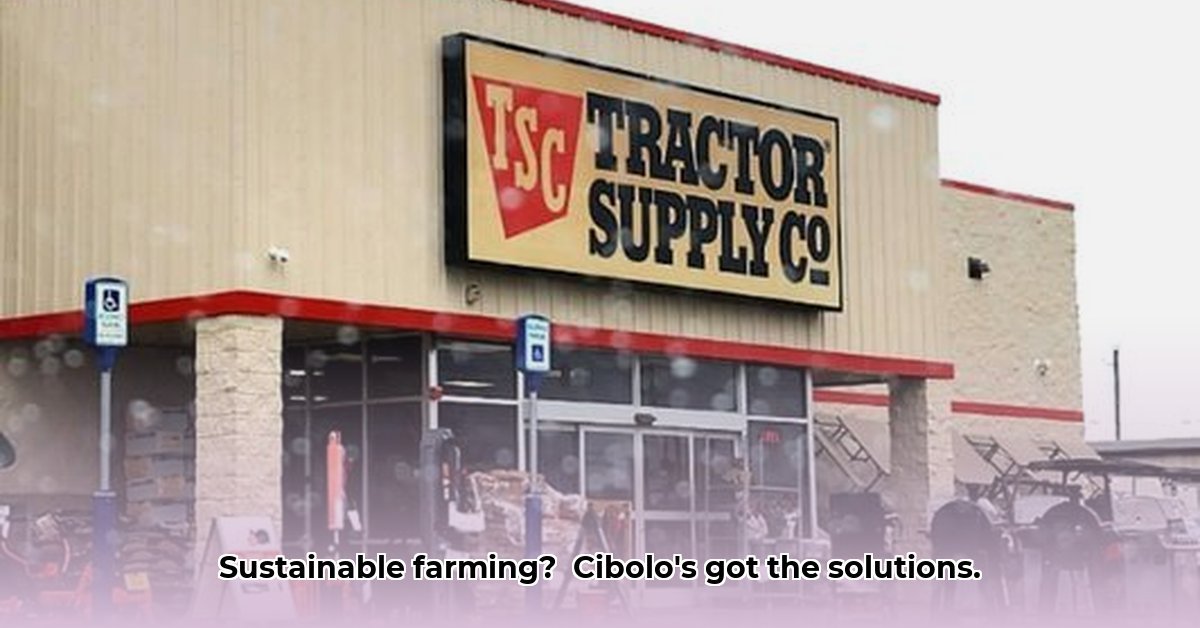
CTS: A Local Hub for Sustainable Agriculture
Cibolo Tractor Supply (CTS) serves as a vital resource for local farmers and ranchers, offering a wide range of products essential for agricultural operations. This readily available access to supplies empowers smaller farms to thrive, fostering local food production and potentially reducing reliance on large-scale, distant industrial farms. This localized approach strengthens the community's economy by creating jobs and stimulating local spending. However, opportunities exist to further enhance CTS's contribution to sustainable agriculture. For sustainable livestock feed options, check out this resource.
How is CTS impacting the Cibolo community? The readily available access to essential farming resources boosts the viability of smaller farms, contributing to a stronger local economy and healthier food system. This creates a mutually beneficial relationship between CTS and the community it serves. But what about the environmental impact?
Shining a Light on Transparency: Areas for Improvement
A key area for growth at CTS lies in increased transparency regarding its environmental impact and supply chain practices. Crucially, more detailed information is needed about steps taken to stock environmentally friendly products, carbon footprint measurement, waste reduction strategies, and responsible material sourcing. Openly sharing this data will build customer trust and allow for informed purchasing decisions. This transparency is essential for fostering a truly sustainable business model. This reflects a broader industry need for greater accountability.
What are the key shortcomings in CTS's current sustainability efforts? A lack of publicly available data on environmental impact, supply chain practices and efforts towards eco-friendly operations makes it difficult to fully assess their commitment to sustainability.
Building a Greener Future: Actionable Steps for All Stakeholders
The transition to a more environmentally responsible agricultural sector requires a collaborative approach involving CTS, farmers, consumers, and government agencies.
For Cibolo Tractor Supply:
Conduct a comprehensive sustainability audit: A thorough assessment of the entire supply chain is needed to pinpoint areas for improvement in energy use, waste generation, and water consumption. (This audit should follow established best practices, such as the Global Reporting Initiative standards.)
Publicly share sustainability metrics: Regularly publish detailed reports on progress toward sustainability goals, including quantifiable data on greenhouse gas emissions, waste reduction, and sustainably sourced products. (This transparency will build trust and accountability.)
Enhance product traceability: Implement a robust system to track product origins and manufacturing processes, ensuring ethical sourcing and responsible manufacturing. (This allows customers to make informed choices based on product origin and production methods.)
For Farmers and Consumers:
Choose sustainable options: Actively select environmentally friendly products from CTS and support businesses with proven sustainability commitments. (Researching certifications, such as USDA Organic, is crucial.)
Support local and organic: Prioritize purchasing locally grown produce and supporting farmers using sustainable practices. This directly impacts the local economy and reduces transportation emissions.
Provide feedback: Communicate your preferences for sustainable practices to CTS, encouraging them to expand their selection of eco-friendly products. (This direct feedback will influence their future purchasing decisions.)
For Government Agencies:
Collaborate with businesses: Partner with CTS and other companies to develop incentives for sustainable agriculture.
Offer financial support: Establish subsidies and grants to help farmers adopt sustainable practices and offset costs associated with transitioning to more eco-friendly methods. (This financial support is crucial for incentivizing adoption of new sustainable practices)
Navigating Sustainable Choices at Cibolo Tractor Supply
Choosing sustainable farming supplies requires careful consideration. Understanding key certifications like USDA Organic is a crucial starting point, but it is key to delve deeper.
Understanding Organic and Sustainable Certifications
Look for certifications such as USDA Organic to verify that products meet specific standards. However, remember that "organic" does not encompass all aspects of sustainability. Consider other eco-friendly labels and assess the product's entire lifecycle impact.
Evaluating Product Sourcing and Packaging
Examine product labels for information on origin and production methods to evaluate supply chain transparency. Support local producers whenever possible to reduce transportation emissions. Choose products with minimal or recyclable packaging; compostable options are ideal.
Analyzing Fertilizer and Pest Control Choices
Prioritize organic fertilizers to avoid the environmental consequences of synthetic alternatives. Soil testing is essential for balanced fertilization. Opt for organic pest control methods and consider Integrated Pest Management (IPM) strategies to minimize pesticide use.
Seed Selection and Biodiversity
Choose organic seeds from heirloom varieties. Supporting biodiversity promotes healthier ecosystems and helps maintain genetic diversity within the agricultural sector.
The Road Ahead: A Collaborative Effort
Creating a truly sustainable agricultural system requires a collaborative approach. CTS plays a vital role, but collective action is necessary. By working together – CTS, farmers, consumers, and governmental entities – a healthier and environmentally friendly agricultural future can be achieved. Every choice from product selection to policy implementation contributes to this shared goal.